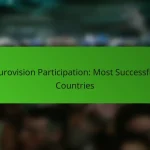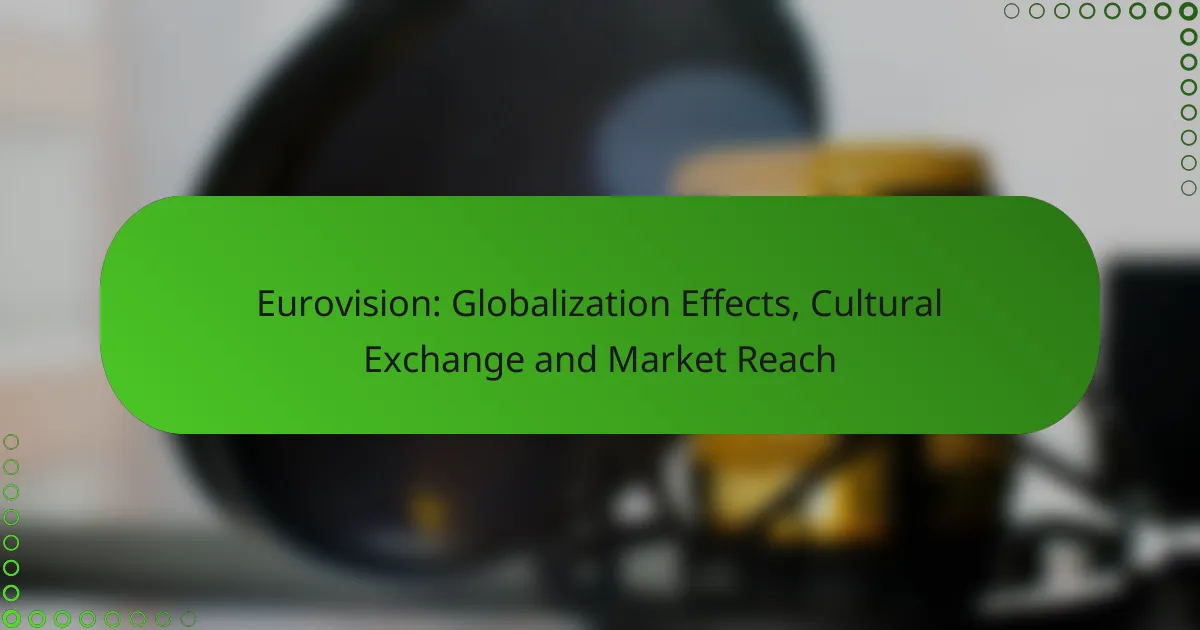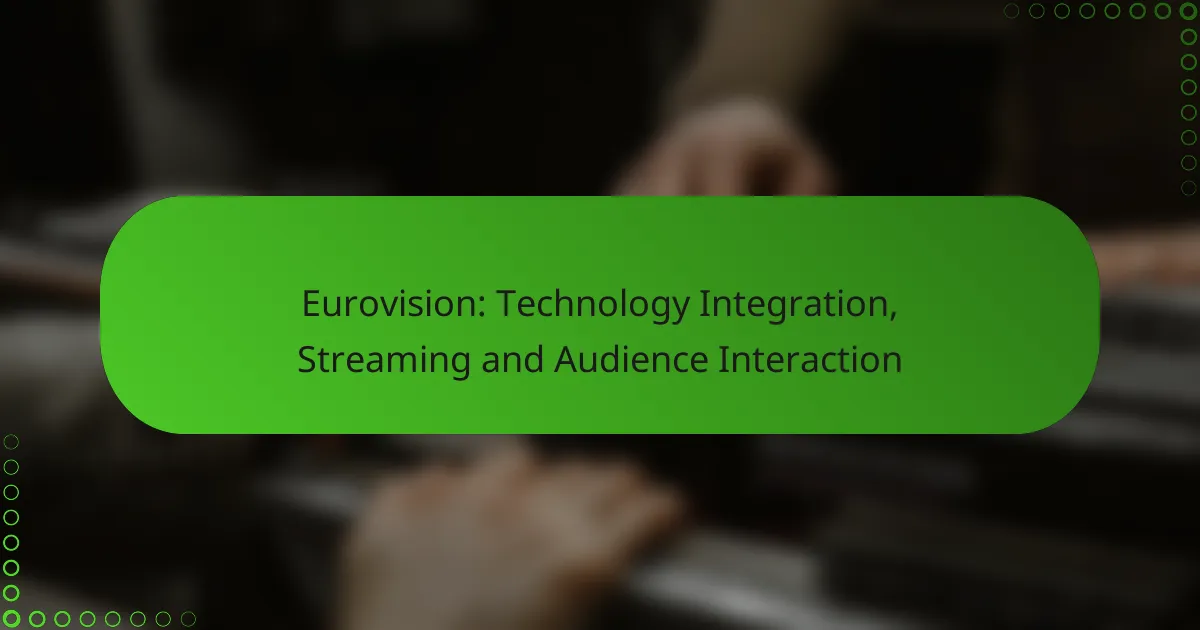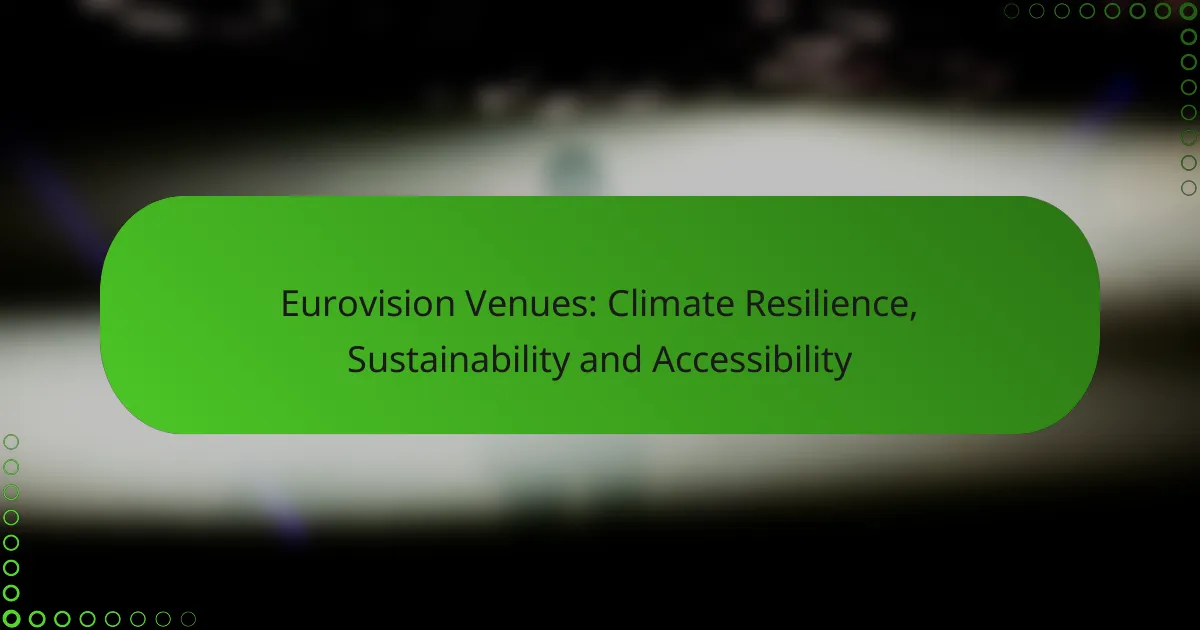The Eurovision Song Contest serves as a powerful catalyst for globalization in music, offering a unique platform for artists from various cultural backgrounds to present their work to a global audience. By fostering collaboration and cultural exchange, Eurovision not only highlights the richness of diverse musical traditions but also enhances market reach for participating artists, opening doors to new opportunities and audiences worldwide.
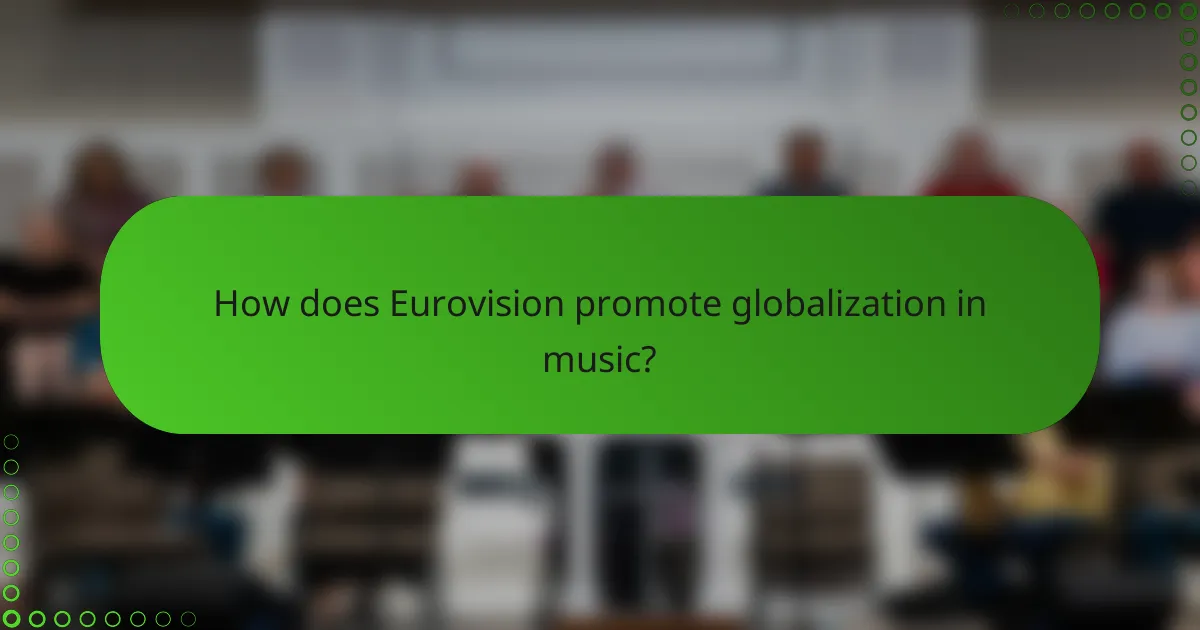
How does Eurovision promote globalization in music?
Eurovision promotes globalization in music by providing a platform for diverse artists to showcase their talents on an international stage. This event fosters collaboration and cultural exchange, allowing different musical styles and traditions to influence one another.
Increased international collaboration
Eurovision encourages increased international collaboration among artists, producers, and songwriters from various countries. Many entries are co-written by teams that include members from multiple nations, blending different musical influences and styles.
This collaboration not only enhances the quality of the music but also creates networks that can lead to future projects beyond the competition. For example, successful Eurovision collaborations often result in joint tours or album releases across borders.
Cross-cultural musical influences
The event serves as a melting pot for cross-cultural musical influences, where artists incorporate elements from their own traditions while embracing styles from others. This fusion can be seen in the use of traditional instruments alongside modern pop beats, creating unique sounds that appeal to a wider audience.
For instance, a song might feature Balkan folk melodies combined with electronic dance music, showcasing how Eurovision artists draw inspiration from their cultural backgrounds while appealing to global tastes.
Global audience reach
Eurovision has a vast global audience reach, with millions of viewers tuning in from various countries. This exposure allows artists to gain recognition far beyond their national borders, often leading to increased streaming and sales internationally.
Countries like Sweden and Italy have seen their artists achieve significant success in global music charts after participating in Eurovision, illustrating the potential for market expansion that the event provides. Additionally, the competition’s online presence further amplifies its reach, engaging fans worldwide through social media and streaming platforms.
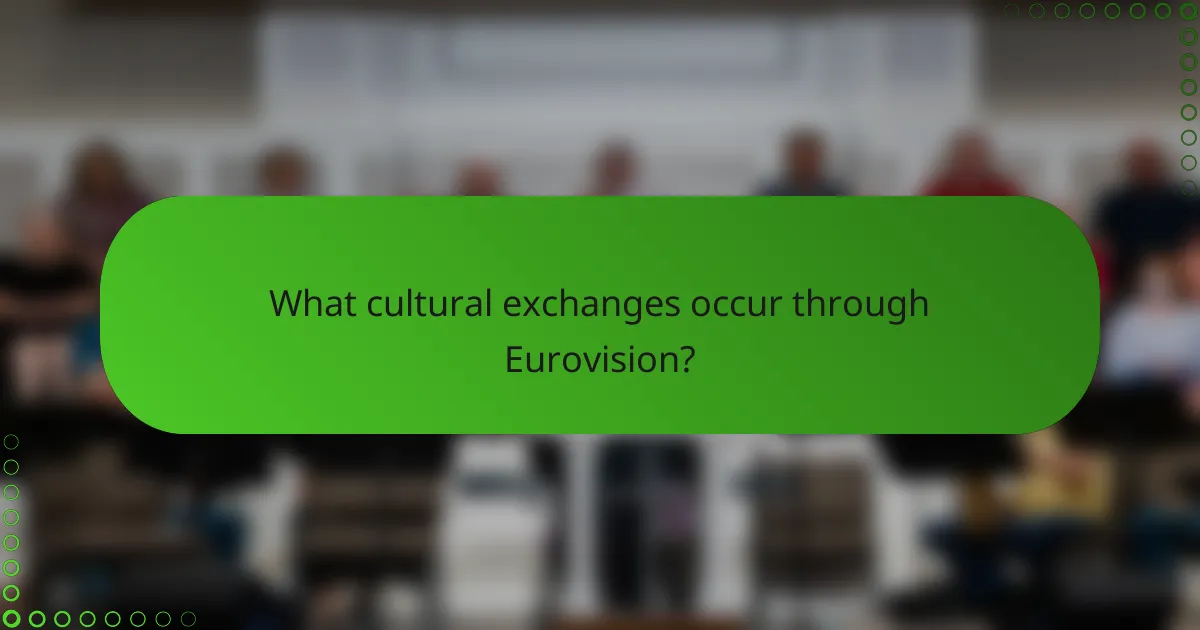
What cultural exchanges occur through Eurovision?
Eurovision facilitates cultural exchanges by bringing together diverse nations to showcase their unique musical traditions and artistic expressions. This annual event promotes understanding and appreciation of different cultures through performances, collaborations, and shared experiences.
Showcasing diverse musical styles
Eurovision highlights a wide array of musical genres, from pop and rock to folk and classical, reflecting the rich tapestry of cultural identities across Europe and beyond. Each participating country presents its own style, often incorporating local instruments and traditional sounds, which allows audiences to experience the variety of global music.
For instance, a performance from Italy may feature operatic elements, while a song from Sweden might emphasize electronic dance music. This diversity not only entertains but also educates viewers about the musical heritage of different nations.
Fostering cultural understanding
Through its platform, Eurovision promotes cultural understanding by encouraging nations to learn about one another’s traditions and values. The event often includes multilingual performances and themes that resonate with universal human experiences, fostering empathy and connection among diverse audiences.
Additionally, the voting system, which involves both public and jury votes, encourages viewers to engage with and appreciate the performances from other countries, creating a sense of community and shared enjoyment.
Collaboration among artists
Eurovision serves as a catalyst for collaboration among artists from different countries, often leading to unique partnerships that blend various musical influences. These collaborations can result in innovative performances that push creative boundaries and showcase the power of cross-cultural exchange.
For example, artists may co-write songs or perform together, merging their distinct styles to create something entirely new. Such collaborations not only enrich the performances but also strengthen ties between nations, promoting a spirit of unity through music.

How does Eurovision impact market reach for artists?
Eurovision significantly enhances market reach for artists by providing a platform that showcases their music to a diverse international audience. This exposure can lead to increased sales, streaming, and opportunities that may not have been available otherwise.
Increased visibility for emerging artists
Eurovision serves as a launching pad for emerging artists, allowing them to gain visibility on a grand scale. Performers often see a surge in social media followers and streaming numbers immediately following their participation.
For instance, artists who perform well can experience a boost in their music charts, sometimes leading to placements in various playlists across Europe. This visibility can be crucial for those looking to establish a foothold in the competitive music industry.
Opportunities for brand partnerships
Participation in Eurovision opens doors for artists to collaborate with brands seeking to leverage the event’s popularity. Companies often look for partnerships with artists who resonate with their target audience, leading to sponsorship deals and promotional opportunities.
For example, an artist may partner with a fashion brand for promotional campaigns, benefiting from both financial support and increased exposure. These partnerships can be especially lucrative, often leading to multi-year agreements that extend beyond the Eurovision event.
Expansion into new markets
Eurovision provides a unique opportunity for artists to penetrate new markets, particularly in countries where they may not have had prior recognition. The event’s international audience allows artists to introduce their music to listeners who may be unfamiliar with their work.
Artists can strategically use their Eurovision performance to tailor their marketing efforts in specific regions, such as launching localized social media campaigns or collaborating with local influencers. This targeted approach can facilitate a smoother entry into new markets, enhancing their overall reach and potential fan base.
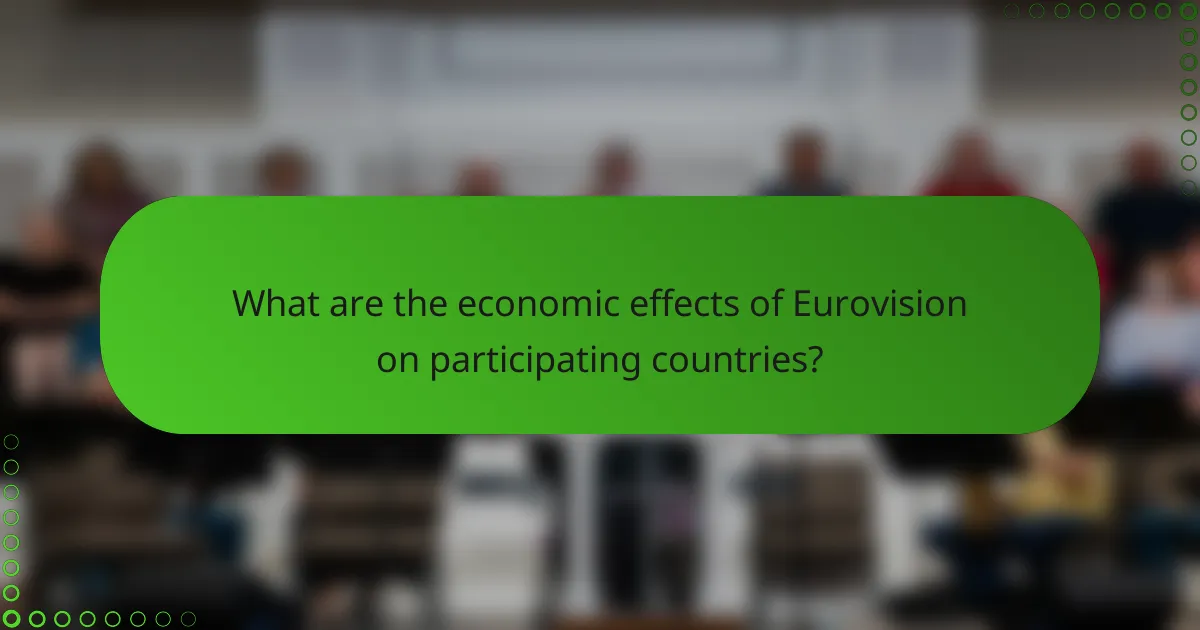
What are the economic effects of Eurovision on participating countries?
The economic effects of Eurovision on participating countries include increased tourism, revenue from broadcasting rights, and growth in local businesses. These factors contribute significantly to the host country’s economy, creating both short-term and long-term benefits.
Boost in tourism
Eurovision often leads to a substantial boost in tourism for the host country. Visitors flock to the event, leading to increased bookings in hotels, restaurants, and local attractions. For example, cities that host Eurovision can see tourist numbers double or even triple during the event week.
To maximize this effect, host countries should promote local culture and attractions to enhance the visitor experience. Offering special packages or discounts can further entice tourists to explore beyond the event itself.
Revenue from broadcasting rights
Participating countries generate significant revenue from broadcasting rights associated with Eurovision. National broadcasters pay fees to secure the rights to air the event, which can range from hundreds of thousands to millions of euros, depending on the country and its viewership potential.
This revenue can be reinvested into local media and entertainment industries, fostering further growth and innovation. Countries should consider leveraging their participation to negotiate better broadcasting deals that reflect their audience size and engagement.
Local business growth
Local businesses often experience growth during Eurovision due to increased foot traffic and heightened visibility. Restaurants, shops, and service providers can see a surge in sales as attendees seek food, souvenirs, and experiences related to the event.
To capitalize on this influx, businesses should prepare in advance by enhancing their offerings and staffing. Collaborating with local tourism boards can help create promotional campaigns that attract visitors and maximize sales opportunities during the event.
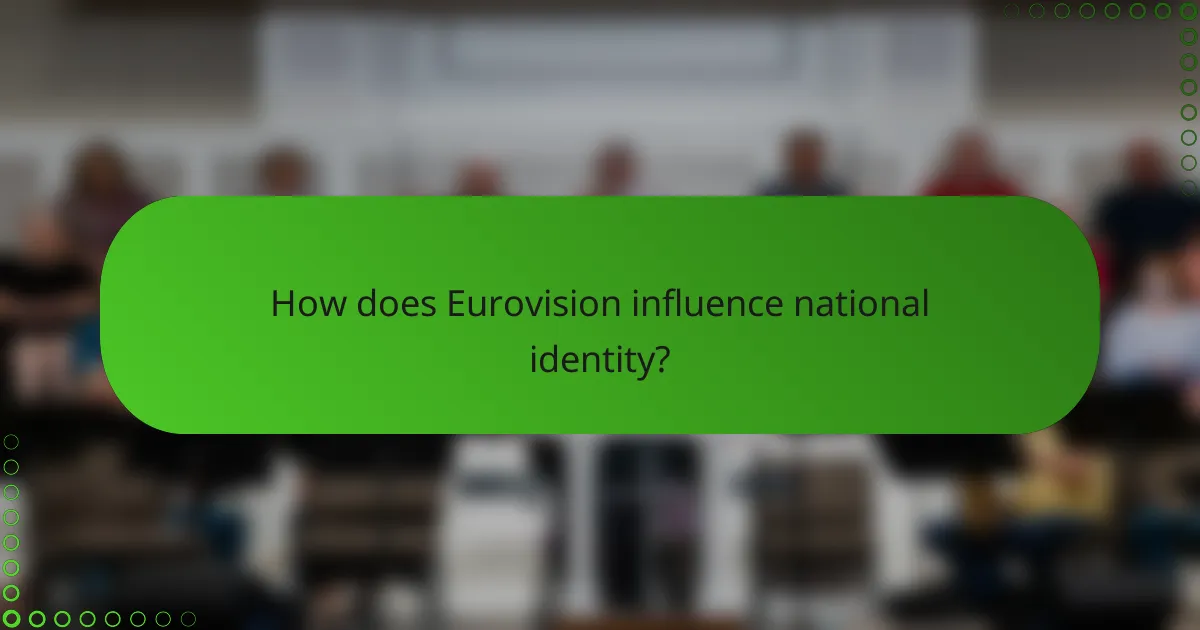
How does Eurovision influence national identity?
Eurovision significantly influences national identity by providing a platform for countries to showcase their unique cultural elements through music. This event fosters a sense of pride and belonging among citizens, while also allowing nations to project their values and heritage to a global audience.
Expression of cultural pride
Participating in Eurovision allows countries to express their cultural pride by highlighting traditional music, dance, and costumes. For instance, nations often incorporate folk elements into their performances, which resonate with local audiences and strengthen national identity. This celebration of culture can enhance national unity and encourage appreciation for local traditions.
Moreover, the visibility gained from Eurovision can lead to increased interest in a country’s cultural products, such as music, art, and tourism. Countries like Portugal and Sweden have successfully leveraged their Eurovision entries to promote their cultural heritage on a larger scale.
Political implications of song choices
Song choices in Eurovision can carry significant political implications, reflecting current social issues or national sentiments. For example, entries may address themes of unity, diversity, or even political struggles, resonating with both domestic and international audiences. This can lead to discussions about a country’s political landscape and its values.
Additionally, countries may strategically select songs that align with their political goals or diplomatic relations. For instance, a nation may choose a song that promotes peace and cooperation to strengthen ties with neighboring countries, showcasing how music can serve as a tool for political messaging.
National branding through music
Eurovision serves as a powerful vehicle for national branding, allowing countries to craft a specific image through their musical presentations. By choosing distinctive musical styles and visual aesthetics, nations can create a memorable brand that resonates with viewers. For example, Italy often emphasizes its rich musical heritage, while countries like Israel focus on modern pop influences.
Effective branding through Eurovision can lead to increased tourism and international interest in a country’s cultural exports. Countries that successfully leverage their Eurovision presence often see a boost in their global recognition, making it a strategic opportunity for national promotion.
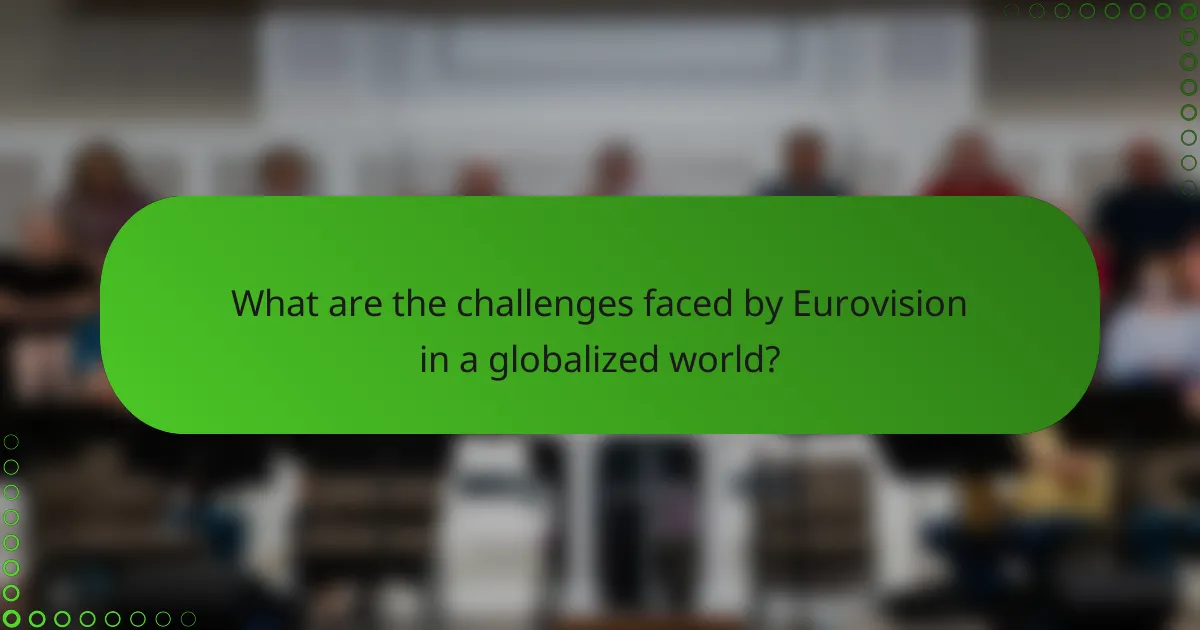
What are the challenges faced by Eurovision in a globalized world?
Eurovision faces several challenges in a globalized world, including maintaining cultural authenticity while appealing to a broader audience. The competition must navigate the complexities of cultural representation, audience expectations, and commercial interests.
Balancing cultural representation
Balancing cultural representation is crucial for Eurovision as it showcases diverse musical traditions from participating countries. Each nation aims to present its unique identity, but this can lead to conflicts when certain cultures feel overshadowed or misrepresented by dominant trends.
To effectively balance representation, Eurovision organizers can implement guidelines that encourage authentic cultural expressions while ensuring that no single culture monopolizes the spotlight. For instance, they might promote regional music styles or collaborate with local artists to enhance authenticity.
Countries should also be mindful of how their entries resonate with both domestic and international audiences. Engaging local communities in the selection process can help ensure that the chosen songs reflect genuine cultural narratives, fostering a sense of pride and ownership.
